Taiwan's Residential Real Estate Market Analysis 2025
Taiwan’s once-heated housing market is beginning to cool, as property demand softens amid the central bank’s tighter credit controls, stricter loan rules, and constrained housing supply. Consequently, home prices have started to stabilize.
Table of Contents
- Housing Market Snapshot
- Historic Perspective
- Demand Highlights
- Supply Highlights
- Rental Market
- Mortgage Market
- Socio-Economic Context
Housing Market Snapshot
In Q3 2025, Taiwan's Lutheran home price index registered a meager growth of just 0.14% from the preceding year, a sharp slowdown from the double-digit growth of 12.47% in Q3 2024, based on figures released by Sinyi Real Estate Planning and Research.
Taiwan's house price annual change:
Note: Taiwan House Price Index: All Residential Dwellings (Q1 2016 = 100).
Data Source: Sinyi Real Estate Planning and Research.
When adjusted for inflation, nationwide house prices were actually down by 1.1% year-on-year in Q3 2025, its second consecutive quarter of decline.
In Taipei, the capital, house prices rose slightly by 0.19% (but declined by 1.05% in real terms) in Q3 2025 from a year earlier, a sharp deceleration from the prior year's strong growth of 10.46%. Quarterly, nominal house prices in Taipei increased by 0.54% during the latest quarter, but hardly changed when adjusted for inflation.
For the country's other major cities:
- New Taipei house prices fell slightly by 0.1% (-1.3% inflation-adjusted) y-o-y in Q3 2025, in stark contrast to the prior year's 12.35% increase. Quarter-on-quarter, prices increased by a modest 3.79% (3.19% inflation-adjusted).
- Taoyuan house prices dropped 3.72% (-4.91% inflation-adjusted) in Q3 2025 from a year ago, a sharp turnaround from the year-on-year growth of 18.68% recorded in Q3 2024. Quarterly, prices were down by an average of 1.23% (-1.8% inflation-adjusted) in Q3 2025.
- Hsinchu house prices declined by 2.34% (-3.54% inflation-adjusted) during the year to Q3 2025, in contrast to the year-on-year growth of 17.72% recorded in the previous year. During the latest quarter, prices were up by 2.47% (1.88% inflation-adjusted) q-o-q.
- Taichung house prices also declined by 5.44% (-6.61% inflation-adjusted) in Q3 2025 from a year earlier, following a strong year-on-year growth of 12.83% in the previous year. Quarterly, house prices fell by 2.14% (-2.7% inflation-adjusted).
- Tainan house prices dropped 2.62% (-3.83% inflation-adjusted) in Q3 2025 from a year ago, in stark contrast to the year-on-year increase of 7.92% in Q3 2024. Quarterly, prices were down by 2.06% (-2.62% inflation-adjusted) during the latest quarter.
- Kaohsiung house prices fell by 5.71% (-6.88% inflation-adjusted) year-on-year in Q3 2025, in contrast to the strong growth of 13.56% in Q3 2024. Quarter-on-quarter, prices were down by 1.79% (-2.36% inflation-adjusted).
Demand is declining rapidly, mainly due to the central bank's ongoing selective credit controls, tighter loan restrictions, and limited supply of new homes. In the first nine months of 2025, property transactions plummeted by 28.1% year-on-year to 194,976 units, according to the Ministry of Interior. It marks the lowest level for the period since 2017.
Likewise, the residential construction sector is now slowing again. In the first nine months of 2025, the total number of residential construction licenses fell by 2.6% to 108,647 units compared to a year ago, according to figures from the Ministry of Interior. This followed an increase of 7.3% in the full year of 2024 and a sharp decline of 19.1% in 2023.
Overall economic conditions continue to improve. Taiwan's economy grew strongly by 7.64% in Q3 2025 from a year earlier, following year-on-year expansions of 8.01% in Q2 and 5.45% in Q1. This marked the tenth straight quarter of economic growth, driven largely by the global boom in AI development. Taiwan's stronghold in advanced semiconductor and server manufacturing has made it a major beneficiary of AI-driven demand, as seen in its record-high export performance in August 2025.
Taiwan's economy is projected to grow by 4.45% this year, an improvement from annual expansions of 4.3% in 2024, 1.1% in 2023, and 2.7% in 2022, according to the Directorate-General of Budget, Accounting and Statistics (DGBAS). Recently, the International Monetary Fund (IMF) upgraded its economic growth forecast for Taiwan, raising its projected real GDP growth rate to 3.7% this year, up from 2.9% in its April forecast.
Historic Perspective:
Housing affordability is a major problem
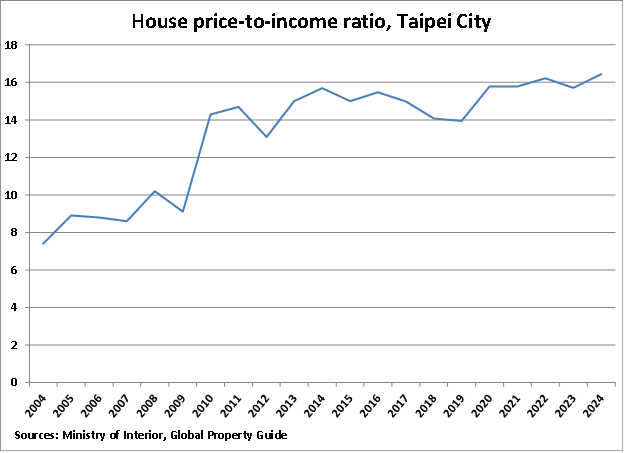
Taipei is one of the world's most expensive cities. Taipei's house price-to-income ratio has risen sharply from just 6.4 in 2004 to about 16.43 by end-2024, according to the country's Ministry of Interior (MOI). It was far higher than Greater London (9.1x), New York (7.4x), Toronto (8.4x), Sydney (13.8x), or Vancouver (11.8x). It was even higher than Hong Kong's 14.4, which was ranked by Demographia's 2025 International Housing Affordability report as the world's least affordable market.
Nationwide, the house price-to-income ratio stood at 10.76 in 2024, up from 9.6 in the previous year and from 8.58 before the Covid-19 pandemic, based on MOI figures.
Years ago, Taipei's former mayor, Ko Wen-je, stressed the urgent need to resolve the country's affordable housing crisis before it provokes social unrest, similar to the case of Hong Kong.
"[In Hong Kong], high rent and housing prices are causing class struggle, a widening wealth disparity, and accumulating resentment among young people," said Ko. "Unless the problem is resolved, Hong Kong's problem today could become Taiwan's tomorrow."
To address the problem, Ko announced that the city plans to build 50,000 public housing units in the next seven years.
From 2015 to 2023, about 200,000 social housing units have been added in Taiwan - 120,000 built by the government and 80,000 from government-sponsored leases.
In early December 2023, Taiwan's Cabinet approved a new plan to raise the supply of social housing to 1 million units by 2032.
By 2025, the Ministry of the Interior refined this goal into an eight-year plan (2025-2032) that includes 250,000 newly built units, 250,000 sub-leased or managed rental units, and rent subsidies for 500,000 households.
Housing demand was boosted after 2009 when the government cut inheritance tax rates from 50% to 10%, and interest rates were cut. Unmonitored speculation, low housing supply, and a long tradition of homeownership pushed house prices in Taiwan, particularly in the capital city, and especially on high-end properties. A three-bedroom apartment, which cost just TWD6 million (US$195,000) to TWD7 million (US$227,500) in 1995, was sold for over TWD20 million (US$650,000) last year.
From 2000 to Q3 2025, house prices in Taiwan's major cities have skyrocketed:
- In Taipei, the house price index rose by 284% (183% inflation-adjusted)
- In New Taipei City, the house price index rose by 361% (241% inflation-adjusted)
- In Taoyuan, the house price index rose by a whopping 431% (292% inflation-adjusted)
- In Hsinchu, the house price index was up by 412% (278% inflation-adjusted)
- In Taichung, the house price index soared by 423% (286% inflation-adjusted)
- In Kaohsiung, the house price index increased by 326% (214% inflation-adjusted)
"Unfortunately, buying a home remains unaffordable for most young Taiwanese, a situation we don't expect to change in the medium term," said Emily Dabbs of Moody's Analytics. An average household in Taipei needs to pay two-thirds of its income for a mortgage loan, far above the affordable limit of 30%.
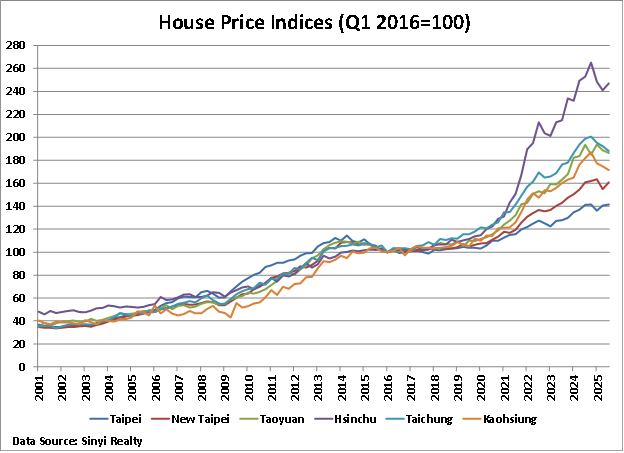
Taiwan's two-decade battle against property speculation
Worries about mainland speculators peaked in early 2008 when residential property prices rose by more than 10% y-o-y during the first quarter. Upward pressure further increased when Chinese banks based in Taiwan were able to offer mortgages after the signing of an MOU in November 2009.
From October 2009 onwards, the central bank actively urged banks to closely monitor mortgage lending risks. A big step was to assign a 100% risk weighting to non-owner-occupied residential mortgages. Risk weightings for other home mortgage portfolios range from 50% to 80%, compared with 10%-20% for banks in other developed markets in Asia-Pacific that practice the Internal Ratings-Based Approach to credit risk.
In 2011, a luxury tax was introduced. Second homes not occupied by the owner and sold within one year of purchase were taxed at 15%, and those sold within two years of purchase were taxed at 10%.
From March 2014, much tougher measures were introduced, which caused house prices in Taiwan to drop 7.9% (3.7% inflation-adjusted) from Q2 2014 to Q1 2016. House prices increased by a minimal 1.8% in 2017 and 1.9% in 2018.
These were the measures:
In March 2014, property taxes on non-owner-occupied residential properties were raised to between 1.5% and 3.6%, from 1.2% to 2%.
Inspections of pre-sale house transactions were tightened. State-owned banks lowered loan-to-value ratios for first-time buyers from 80% to 70%, and from 60% to 50% for people owning more than one property.
On January 1, 2016, a new property gains tax of as much as 45% took effect. Property sellers are now required to pay between 15% and 45% of gains based on market prices, instead of the previously used government-assessed values. Qualified property sellers with gains of less than TWD4 million (US$130,000) are exempt from the tax.
However, as the effect of these market-cooling measures wanes, house price growth has accelerated again in recent years. House prices have risen by 7.6% in 2022, following y-o-y increases of 14.6% in 2021, 6.5% in 2020, and 3.2% in 2019.
Because of this, the Executive Yuan approved the Healthy Real Estate Market Plan in December 2020, uniting key agencies to curb speculation, limit excessive property lending, expand social housing, and promote transparency in the housing market.
The government has also introduced measures that would tax houses and presale projects resold within five years of purchase. Accordingly, under the Amendments to the House and Land Transactions Income Tax 2.0, which came into force on July 1, 2021, a tax of 45% will be paid on gains from the sale of property within two years of purchase, and 35% for gains made between two to five years. Foreign individuals and businesses are also required to pay the same amount of tax. According to the Ministry of Finance, the amended holding periods apply to houses and land acquired after January 1, 2016, and sold after July 1, 2021.
| FOR INDIVIDUALS: | ||||
| Pre-amendment | Post-amendment | |||
| Real property holding period | Tax rate | Real property holding period | Tax rate | |
| Resident Individual | Less than 1 year | 45% | Less than 2 years | 45% |
| 1-2 years | 35% | 2-5 years | 35% | |
| 2-10 years | 20% | 5-10 years | 20% | |
| More than 10 years | 15% | More than 10 years | 15% | |
| Non-resident Individual | Less than 1 year | 45% | Less than 2 years | 45% |
| More than 1 year | 35% | More than 2 years | 35% | |
| Sources: Ministry of Finance, Ernst & Young | ||||
Alongside legislative reforms, Taiwan's central bank tightened real-estate lending through several rounds of selective credit controls. From 2020 to 2024, it lowered loan-to-value ratios for second homes, urged banks to strengthen internal lending controls, and further restricted mortgage terms under its seventh amendment in Q3 2024.
To address long-term affordability, the government launched a national program to supply 1 million social-housing units by 2032. By 2024, tens of thousands of public-rental units had been completed, with more under construction.
Demand Highlights:
Demand falling sharply
Property demand is now declining sharply, mainly due to the central bank's ongoing selective credit controls, tighter loan restrictions, and limited supply of new homes. In the first nine months of 2025, property transactions plummeted by 28.1% year-on-year to 194,976 units, according to the Ministry of Interior.
The recent figures mark the lowest level for the period since 2017. In fact, it ranks as the third-lowest on record, with only 175,787 units in Jan-Sep 2016 and 193,238 units in Jan-Sep 2001 lower, according to Evertrust Rehouse Co's Chen Chin-ping.
This is also a sharp reversal from the robust demand seen last year, when transactions of homes, shops, offices, and factories in Taiwan's six major cities - Taipei, New Taipei, Taoyuan, Taichung, Tainan, and Kaohsiung - surged to 271,309 units, up by 14.7% year-on-year and hitting their highest level in 11 years.
Supply Highlights:
Residential construction activity slowing again
The residential construction sector is now slowing again. In the first nine months of 2025, the total number of residential construction licenses fell by 2.6% to 108,647 units compared to a year ago, according to figures from the Ministry of Interior. This followed an increase of 7.3% in the full year of 2024 and a sharp decline of 19.1% in 2023.
Though there are wide variations in Taiwan's major cities:
- In Taipei City, residential construction licenses plunged by 16.7% y-o-y to 4,373 in the first half of 2025.
- In New Taipei City, licenses rose sharply by 20.5% y-o-y to 10,142 in the first half of 2025.
- In Taoyuan, licenses surged by 69.9% to 15,321 in the first half of 2025 from a year earlier.
- In Taichung, residential construction licenses fell slightly by 0.9% y-o-y to 14,001 over the same period.
- In Tainan, licenses dropped by 13.7% y-o-y to 2,908 in the first half of 2025.
- In Kaohsiung, licenses fell by 9.9% to 9,610 in the first half of 2025 from a year earlier.
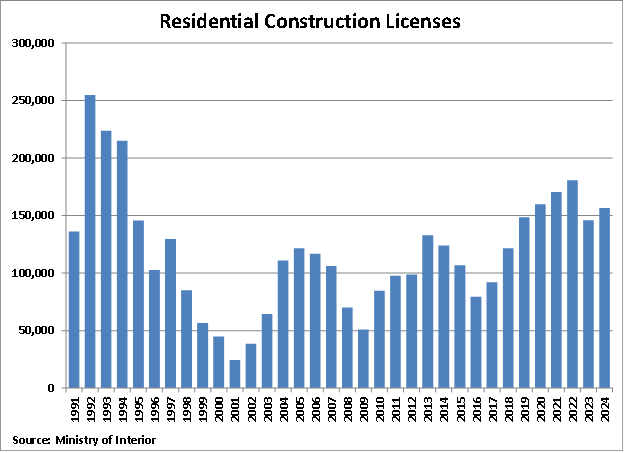
Before registering a huge contraction in 2023, construction activity had been continuously rising in the past several years. Residential construction licenses increased by an annual average of 23% from 2017 to 2019, before slowing to an annual growth of less than 7% from 2020 to 2022.
Rental Market:
Taiwan's vanishingly low rental yields
Taipei now vies with Monaco for the lowest yields in the world. Taipei is not a happy place to be a landlord. The owner of an apartment in Taipei will be lucky to realize more than 3% yields, except for the very smallest apartments.
In Q2 2025, the average rental yields in Taiwan stood at 2.24%, slightly up from 2.15% in Q3 2024 and 2.17% in Q1 2024, based on the recent research conducted by the Global Property Guide.
In major cities:
- In Taipei City, gross rental yields for apartments ranged from 1.82% to 2.39% in Q2 2025, with a city average of 2.11%. Smaller apartments have the lowest rental returns.
- In New Taipei City, apartments generate rental returns between 1.89% and 2.24%, with a city average of 2.02%.
- In Taoyuan City, rental yields ranged from 1.42% to 2.45% in Q2 2025, with a city average of 2.1%.
- In Kaohsiung City, apartments generate rental yields between 1.74% and 3.02%, with a city average of 2.44%.
- In Tainan City, gross rental yields for apartments ranged from 2.13% to 2.79% in Q2 2025, with a city average of 2.51%.
Such low yields are often a sign of an overvalued market. Given that the Global Property Guide's figures are for gross rental yields, i.e., do not make any allowance for vacant periods, legal costs, administration costs, cleaning and repairs, rental taxes, property taxes, and other taxes, it is safe to say that landlords in Taiwan earn nothing on their apartments.
Paradoxically, Taiwan has one of the highest homeownership rates in the world at 87%, while social housing accounts for about 5% of households. And the trend toward home ownership is increasing. Because of this, Taiwan's rental market is quite small, with 8% of the total households being around nine million.
Mortgage Market:
New measures introduced to suppress housing speculators and curb banks' property exposure
In September 2024, the central bank announced a seventh wave of selective credit controls with four main measures, in an effort to further crack down on housing speculators:
- Buyers with existing properties cannot have a grace period for their first home loans, which means that they will have to simultaneously pay the interest and principal.
- The LTV ratio for second-home mortgages has been reduced from 60% to 50% across the country.
- The LTV ratio for corporations and individuals buying luxury homes and third properties has been reduced from 40% to 30%.
- The LTV ratio for developers who use unsold homes as collateral has been reduced from 40% to 30%.
"Going forward, the Bank will keep watch on concentration on real estate lending so as to channel credit resources towards accommodating the funding needs of productive enterprises for real investment, and towards uses aligned with government initiatives such as those in support of non-homeowner mortgage borrowers, urban renewal and reconstruction of unsafe and dilapidated homes, and social housing projects," said the central bank in its September 2025 report.
"Meanwhile, the Bank will review the effectiveness of the selective credit control measures, closely monitor potential impacts of real estate sector-related policies on the housing market, and adjust relevant measures as needed in order to promote financial stability and sound banking operations," added the central bank.
Prior to this, the central bank introduced new credit controls on second-home loans by lowering the maximum loan-to-value (LTV) ratio for second-home mortgages from 75% to 70% in Taipei, New Taipei City, Taoyuan, Taichung, Tainan, and Kaohsiung, as well as in Hsinchu city and county, effective June 16, 2023.
After drawing criticism from housing experts and property developers, who commented that these measures would harm people who need to relocate, the central bank announced in July 2023 that the rule would not apply to those who sell their first home within a year.
Taiwan's Financial Supervisory Commission (FSC) also raised the regulatory risk weights (RW) in February 2022, and applied for new domestic property loans, in an effort to reduce banks' property exposure. More specifically:
- The RW for new housing loans to retail buyers with more than two properties, as well as to corporate buyers, was raised to 50% - 100%, from 20% - 30%, to control speculative property investment.
- The RW for new loans to finance land acquisition and housing inventories was also increased to 150% - 200%, from 75% - 150%.
"The measures should help to moderate the pace of banks' property lending and contain concentration risks. However, we do not believe they will result in a significant reduction in the sector's share of total lending," said Fitch Ratings. "The latest development follows other policy moves that already helped to moderate the growth in property-related loans in 2021, including stricter loan-to-value requirements."
Key rate unchanged, mortgage interest rates continue to increase
In its September 2025 meeting, the Central Bank of the Republic of China (Taiwan) decided to keep the discount rate, the rate on refinancing of secured loans, and the rate on temporary accommodations at their current levels of 2%, 2.375%, and 4.25%, respectively.
The domestic inflation rate is projected to fall below 2% this year and ease further next year. The economy is expected to grow solidly this year and moderately next year. Considering global uncertainties and possible effects of U.S. economic and trade policies, the Board decided to keep rates steady to support stable economic and financial conditions.
The central bank raised its key interest rates six times from March 2022 to March 2024 to curb inflationary pressures. It has also increased the reserve requirements ratio several times to strengthen the effectiveness of its selective credit control measures.
"Going forward, the Bank will closely monitor the implications of uncertainty factors - including the U.S. tariff policy impact, the pace of monetary policy adjustments by major central banks, China's economic downturn risk, geopolitical conflicts, and extreme weather - for Taiwan's economic activity, financial conditions, and price trends," said the central bank in its September 2025 Monetary Policy Decision.
"The Bank will adjust its monetary policy accordingly in a timely manner as warranted to fulfill the statutory duties of maintaining financial and price stability and fostering economic development within the scope of the aforementioned objectives," added the same report.
In September 2025, the average interest rate for housing loans stood at 2.294%, up slightly from 2.19% a year earlier, 2.076% two years ago, and 1.731% three years ago. Despite the increase, it remains very low by international standards.
Taiwan's mortgage loan interest rates:
Note: Interest rates on new mortgages by 5 leading banks
Data Source: Taiwan Central Bank.
New housing loans declining
Taiwan's residential mortgage market is now showing signs of a slowdown. In September 2025, new housing loans plummeted by a huge 54.5% from a year earlier to TWD 50.50 billion (US$1.64 billion), in stark contrast to the year-on-year growth of 56.4% recorded in the same period last year, according to the figures released by the Central Bank of the Republic of China (Taiwan).
In the first nine months of 2025, the total amount of new housing loans stood at TWD 591.97 billion (US$19.24 billion), a sharp decline by around 32.8% from TWD 880.78 billion (US$28.63 billion) in the previous year. This is a sharp turnaround from the strong growth of 76.4% seen in the first nine months of 2024.
This can be partly attributed to the central bank's recent policies. In Q3 2024, the central bank intensified its real estate tightening, directing banks to strengthen internal controls on property lending from Q4 2024 to Q4 2025 and later revising its selective credit measures in September 2024. These actions resulted in lower loan-to-value ratios, easing expectations of housing price increases, and a continued cooling of property transactions.
Loans to non-homeowners and financing for urban renewal and the reconstruction of unsafe or dilapidated housing grew as a share of total housing and construction loans. Consequently, the proportion of real estate loans in total bank lending declined from 37.61% in June 2024 to 36.71% in August 2025.
As a result, the annual growth rate of the total value of outstanding housing loans in Taiwan slowed to 5.4% to reach TWD 11.45 trillion (US$372.18 billion) in September 2025, according to the central bank. It was a slowdown from a strong growth rate of 11.3% in the same period last year. On the other hand, the total value of outstanding loans for construction dropped slightly by 0.4% y-o-y to TWD 3.43 trillion (US$111.55 billion) in September 2025, in contrast to a y-o-y increase of 4.2% in the preceding year.
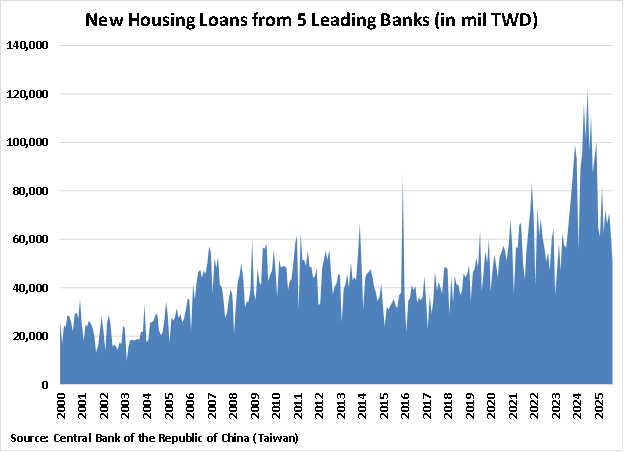
Total outstanding housing loans rose by an average of 5.7% annually from 2009 to 2024.
As a proportion of GDP, the country's residential mortgage market grew to about 44.1% of GDP in 2024, up from 42.5% in the prior year, 39.2% in 2019, and less than 35% in 2015.
Because of the sharp slowdown in new housing loans, the Global Property Guide projects that the size of the residential mortgage market will be more or less steady at approximately 44% of GDP this year.
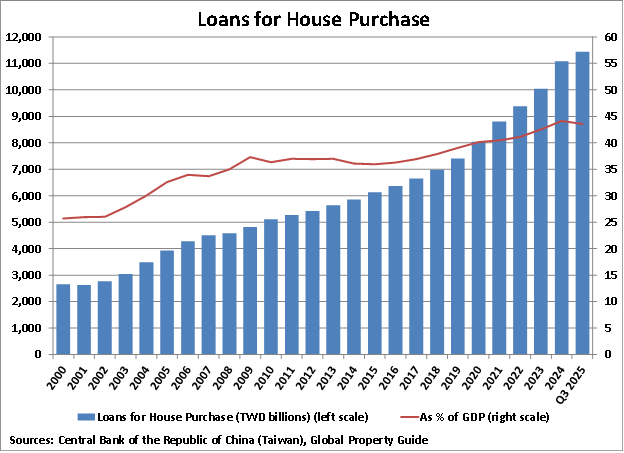
Most residential mortgages in Taiwan are variable rates, with an average maturity of 25 years.
Socio-Economic Context:
Economic outlook improving, exports continue to surge
Taiwan's economy grew strongly by 7.64% in Q3 2025 from a year earlier, following year-on-year expansions of 8.01% in Q2 and 5.45% in Q1. This marked the tenth straight quarter of economic growth, driven largely by the global boom in AI development. Taiwan's stronghold in advanced semiconductor and server manufacturing has made it a major beneficiary of AI-driven demand, as seen in its record-high export performance in August 2025.
Domestic demand lost some steam in Q3 2025, rising only 0.49% compared with 2.23% in the previous quarter. The slowdown was mainly due to weaker government spending, even as household consumption showed a modest improvement. On net external demand, exports of goods and services jumped 30.64%, outpacing a 25.27% increase in imports.
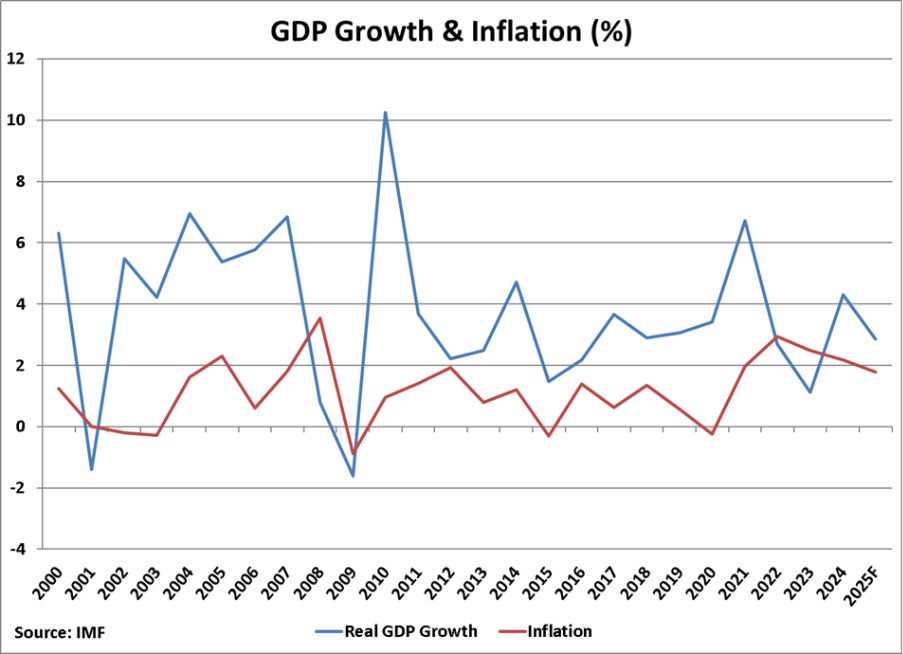
Quarter-on-quarter, Taiwan's seasonally-adjusted real GDP growth rate moderated to 1.31% in Q3 2025, from an expansion of 3.05% in the previous quarter.
Taiwan's economy is projected to grow by 4.45% this year, an improvement from annual expansions of 4.3% in 2024, 1.1% in 2023, and 2.7% in 2022, according to the Directorate-General of Budget, Accounting and Statistics (DGBAS). Recently, the International Monetary Fund (IMF) upgraded its economic growth forecast for Taiwan, raising its projected real GDP growth rate to 3.7% this year, up from 2.9% in its April forecast.
Taiwan, which is heavily dependent on exports, was seriously affected by the US economic recession in 2008. The economy bounced back in 2010 with spectacular growth of 10.6%. From 2011 to 2019, the Taiwanese economy grew by an annual average of 2.9%. Despite the Covid-19 pandemic, the economy managed to post a modest growth of 3.4% in 2020.
As the economy reopened and activity rebounded, Taiwan recorded a strong 6.7% growth rate in 2021, its fastest in over a decade.
Exports, which account for about 60% of the country's GDP, are increasing strongly again. In September 2025, exports totaled US$54.25 billion, up by a huge 33.8% from a year earlier and the third-highest monthly level on record, according to the Ministry of Finance. It was the 23rd consecutive month of year-on-year growth, mainly driven by strong global demand for artificial intelligence (AI) applications, high-performance computing tools, and the release of new mobile devices.
In the first nine months of 2025, Taiwan's total exports reached US$452.68 billion, an increase of 29.7% from the previous year. Likewise, imports also rose by 22% y-o-y to US$353.41 billion over the same period. As such, the trade surplus rose by almost 67% y-o-y to reach US$99.27 billion in the first nine months of the year.
China and Hong Kong remained Taiwan's largest trading partners, after purchasing US$132.3 billion worth of merchandise from January to September 2025, up by 21.4% from a year earlier. Mainland China and Hong Kong accounted for about 29.2% of Taiwan's total exports during the period.
Overall inflation slowed to 1.25% in September 2025, down from 1.6% in the previous month and 1.82% in the same period last year, based on figures from DGBAS. The nationwide inflation rate averaged less than 1% in 2010-2020, before increasing to 2.6% in 2021, and 2.7% annually in both 2022 and 2023. Inflation moderated to an average of 2.3% in 2024.
In September 2025, the seasonally-adjusted unemployment rate was 3.35%, unchanged from the previous month but slightly lower than last year's 3.4%, as labor market conditions remain robust.
Taiwan's jobless rate has remained steadily below 4% over the past decade.
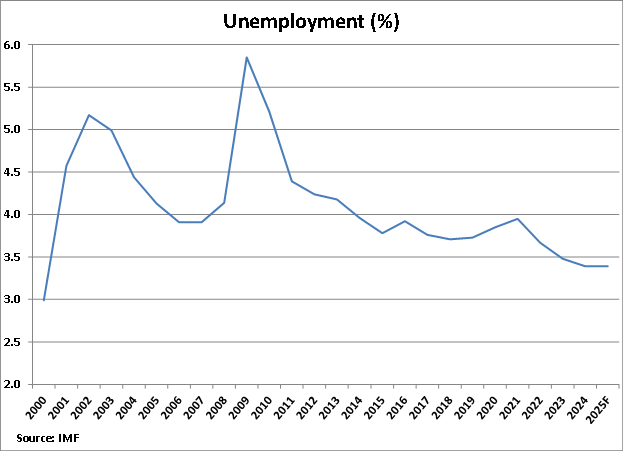
Another pro-sovereignty president elected
In the January 2024 presidential elections, Taiwanese voters elected yet another pro-sovereignty candidate, William Lai, to become the new president of Taiwan, solidifying a direction that is increasingly divergent from Mainland China. Lai officially assumed office in May 2024. This marked the third presidential election win for the independence-leaning Democratic Progressive Party (DPP).
In October 2024, Taiwan unveiled its intention to join the IMF in a bid to enhance the country's financial resilience against China. Accordingly, Taiwan is also seeking to participate in the WHO's annual World Health Assembly and join Interpol to boost its global status. Taiwan also formally applied to become a member of the Comprehensive and Progressive Agreement for Trans-Pacific Partnership in September 2021, but as of today, its application remains under review, with China's prior application and political sensitivities slowing the process.
Lai took a firmer stance against Beijing, officially designating China as a "foreign hostile force" in March 2025 due to its growing infiltration and coercion efforts. In response, China launched large-scale military drills around Taiwan the following month, widely seen as a direct show of force against Lai's administration.
The conflict between Mainland China and Taiwan started to escalate in 2016 when Tsai Ing-wen of the DPP assumed office and became Taiwan's first female president. One of Tsai's key economic policies is to reduce Taiwan's reliance on Mainland China, which accounts for an average of around 40% of the island's exports every year. Tsai plans to form closer ties with ASEAN.
Mainland China is highly suspicious of Tsai, warning her against any attempt at a formal breakaway. Early in 2016, the Chinese government announced that it had cut off official contact with Taipei. In December 2016, Taiwan sent a blunt message to China by preparing its military forces and stepping up its training exercises to fend off Beijing's threats.
Taiwan's relations with China reached a new low after China decided to boycott the Olympic-style sporting event, the 2017 Summer Universiade, which was held in Taipei in August 2017.
In June 2018, the construction of a US$250 million complex that will house the new American Institute in Taiwan (AIT), which serves as the United States' de facto embassy in Taipei, further escalated the tensions between Taiwan and Mainland China.
In July 2019, the US announced its intent to sell 108 M1A2T Abrams tanks and Stinger missiles worth US$2.2 billion to Taiwan, despite China's demand to cancel the said sale. The weapons deal is a signal to China of the US commitment to Taiwan. As an expression of outrage, China said that it would impose sanctions on US firms involved in the weapons sale, as it harmed China's sovereignty and national security.
In September 2019, both Solomon Islands and Kiribati severed ties with Taiwan and officially recognized Beijing, amidst the latter's assurance of providing development assistance to these small countries.
In the January 2020 presidential elections, Tsai won her second term in office, after defeating her major challenger Han Kuo-yu of the mainland-friendly Kuomintang by close to 3 million votes.
Then, in December 2021, Nicaragua also switched diplomatic recognition from Taipei to Beijing. Other diplomatic allies that have cut ties with Taiwan since Tsai came to office include Burkina Faso, the Dominican Republic, Sao Tome and Principe, Panama, and Honduras.
Then, in January 2024, Nauru became the latest country to cut diplomatic ties with Taiwan, just days after the presidential elections.
"China stealing our allies, pressuring our international space won't shrink the distance across the strait and won't allow for peaceful, friendly development of cross-strait relations," said Taiwan's former foreign minister Joseph Wu.
Taiwan now has only 12 diplomatic allies left.
China's campaign to isolate Taiwan extends to minute details. In recent years, Beijing has been sending warnings to airlines to list "Taiwan, China", rather than just "Taiwan", on their websites. In addition, China fined a Japanese clothing company for listing Taiwan as the "country of origin" on packaging.
China has also ramped up military pressure on Taiwan through repeated incursions into the latter's airspace.
Taiwan has steadily increased its defense budget in recent years amid rising security tensions. In 2024, the government allocated a record US$19 billion, equivalent to roughly 2.5% of GDP, including special funds for advanced weapons and asymmetric defense programs. The budget rose further to US$19.7 billion in 2025 and is set to climb again to US$31.3 billion in 2026 - equivalent to 3.32% of its projected GDP. Despite this, China's defense spending remains vastly larger, estimated to be more than twelve times that of Taiwan's.
Prior to this, relations between mainland China and Taiwan thawed when President Ma of the Kuomintang Party (KMT) assumed office in May 2008. He vowed greater cooperation with Mainland China and denounced independence for Taiwan, a sharp contrast to his nationalist but corrupt predecessor, Chen Shui-bian. In November 2009, several memorandums of agreement between Taiwan and China on financial cooperation were signed. These gestures reassured investors and home buyers alike. In June 2010, an Economic Cooperation Framework Agreement (ECFA) was signed by Taiwan and China. President Ma also accepted the 1992 consensus, which played a crucial role in lowering tensions with China and boosting cross-strait economic ties.
Ironically, most Taiwanese people favor neither formal independence nor eventual unification with China. Based on a June 2025 survey conducted by the Election Study Center of the National Chengchi University, only 4.3% of the population supported independence as soon as possible, while 1.1% were in favor of unification with mainland China. The rest of the respondents want to maintain the status quo indefinitely with no move towards either independence or unification.
Sources:
- Q3 2025 (Xinyi House Price Index) (Sinyi Real Estate Planning and Research): https://www.sinyinews.com.tw/
- Housing transfers sharply cool to the lowest since 2017 (Taipei Times): https://www.taipeitimes.com/
- The price-to-income ratio in the fourth quarter of 2024 decreased slightly to 10.76 (United Daily News): https://udn.com/
- Demographia International Housing Affordability 2025 Edition (Chapman University): https://www.chapman.edu/
- Cabinet approves social welfare housing measures (Taipei Times): https://www.taipeitimes.com/
- Cabinet approves plan to raise social housing to 1 million units by 2032 (Focus Taiwan): https://focustaiwan.tw/
- Excerpts of Amendments to House and Land Transactions Income Tax 2.0 (Ministry of Finance): https://www.mof.gov.tw/
- Taiwan amends capital gains tax law for transfers of real property (EY): https://www.ey.com/
- Gross rental yields in Taiwan: Taipei and 4 other cities (Global Property Guide): https://www.globalpropertyguide.com/
- Taiwan's Central Bank hits housing speculators with four curbs (Taiwan News): https://www.taiwannews.com.tw/
- Credit controls eased on 2nd-home buyers to replace old houses (Focus Taiwan): https://focustaiwan.tw/
- Taiwan Regulators Move to Curb Banks' Property Exposure (Fitch Ratings): https://www.fitchratings.com/
- Taiwan Interest Rate (Trading Economics): https://tradingeconomics.com/
- New loan amounts and interest rates of the five major banks (Central Bank of the Republic of China (Taiwan)): https://www.cbc.gov.tw/
- Consumer loans and construction loans outstanding (Ministry of Digital Affairs): https://data.gov.tw/
- Monetary Policy Decision of the Board Meeting (2025Q3) (Central Bank of the Republic of China (Taiwan)): https://www.cbc.gov.tw/
- Taiwan GDP Annual Growth Rate (Trading Economics): https://tradingeconomics.com/
- GDP: Advance Estimate of 2025Q3 (Directorate General of Budget, Accounting & Statistics): https://eng.dgbas.gov.tw/
- GDP: Preliminary Estimate for 2025Q2 and Outlook for 2025-26 (Directorate General of Budget, Accounting & Statistics): https://eng.dgbas.gov.tw/
- IMF raises Taiwan's 2025 growth forecast to 3.7% (Overseas Community Affairs Council, R.O.C.): https://www.ocac.gov.tw/
- Economic Growth Rate (National Statistics): https://eng.stat.gov.tw/
- Taiwan September export orders sharply beats forecasts on strong AI demand (Reuters): https://www.reuters.com/
- Taiwan's exports rise for 23rd straight month in September (Focus Taiwan): https://focustaiwan.tw/
- CPI Change Rate (National Statistics): https://eng.stat.gov.tw/
- Unemployment Rate (National Statistics): https://eng.stat.gov.tw/
- Taiwan country profile (BBC News): https://www.bbc.com/
- Taiwan seeks to join the IMF (Taipei Times): https://www.taipeitimes.com/
- Taiwan wants to join the IMF to get financial protection from China (AP): https://apnews.com/
- Taiwan loses second ally in a week as Kiribati switches to China (The Guardian): https://www.theguardian.com/
- Nicaragua cuts diplomatic ties with Taiwan and recognises Beijing (Financial Times): https://www.ft.com/
- Honduras cuts ties with Taiwan, opens relations with China (Al Jazeera): https://www.aljazeera.com/
- Taiwan loses diplomatic ally to China days after presidential election (CNN): https://edition.cnn.com/
- Diplomatic Allies (Ministry of Foreign Affairs): https://en.mofa.gov.tw/
- Taiwan submits application to join CPTPP trade deal (Focus Taiwan): https://focustaiwan.tw/
- Taiwan's president labels China a 'foreign hostile force' and ramps up security measures, citing 'infiltration' (The Guardian): https://www.theguardian.com/
- China targets Taiwan's president with military drills, calls him 'parasite' (Washington Post): https://www.washingtonpost.com/
- Taiwan's 2024 defense budget to hit record NT$606.8bn: Tsai (Taipei Times): https://www.taipeitimes.com/
- Defense spending to reach unprecedented 3.3% of GDP (Taipei Times): https://www.taipeitimes.com/
- Ex-U.S. Army secretary praises Taiwan's pledge to raise defense spending (Focus Taiwan): https://focustaiwan.tw/
- Taiwan Independence vs. Unification with the Mainland (1994/12~2025/06) (Election Study Center, National Chengchi University): https://esc.nccu.edu.tw/